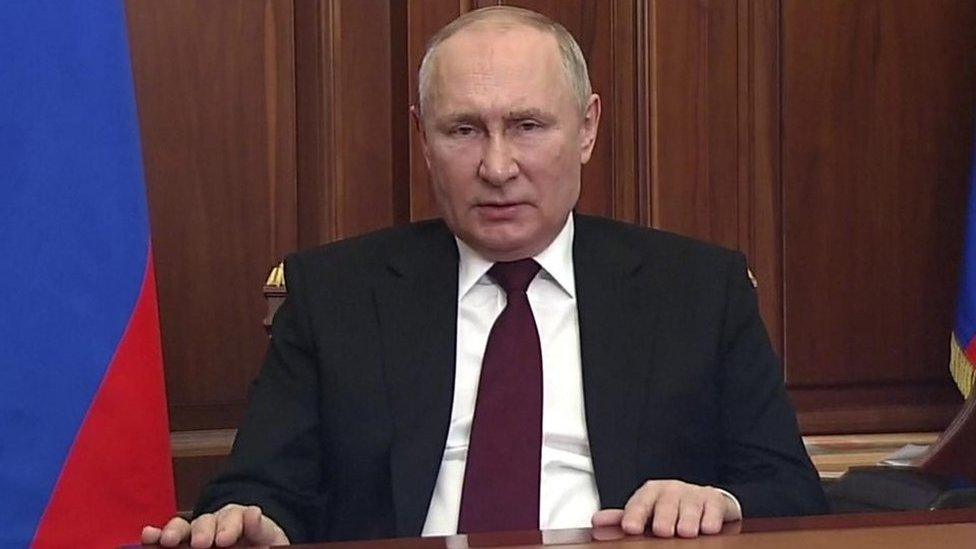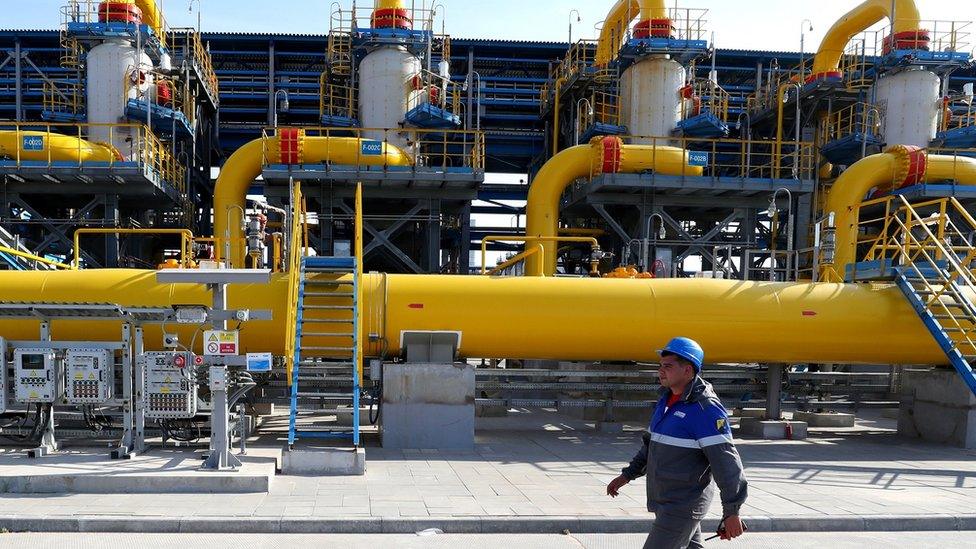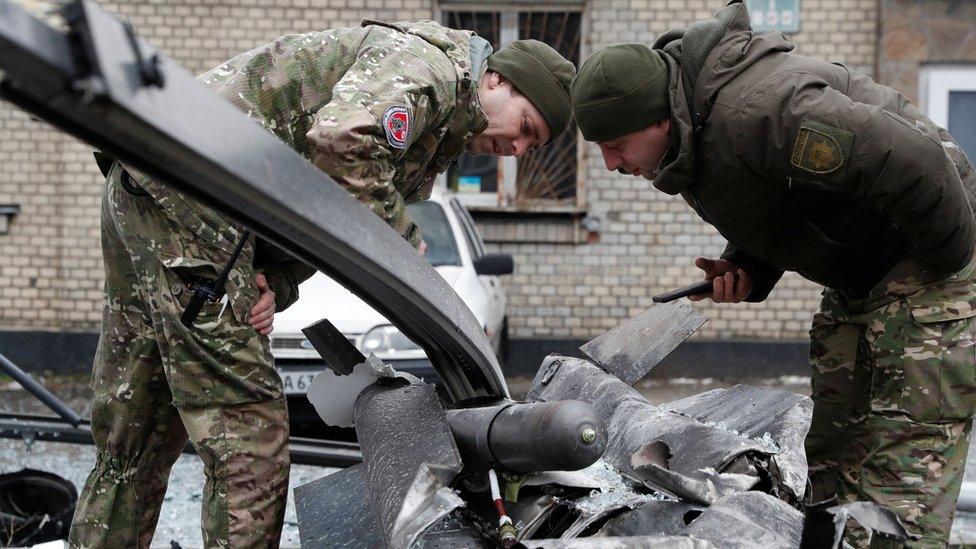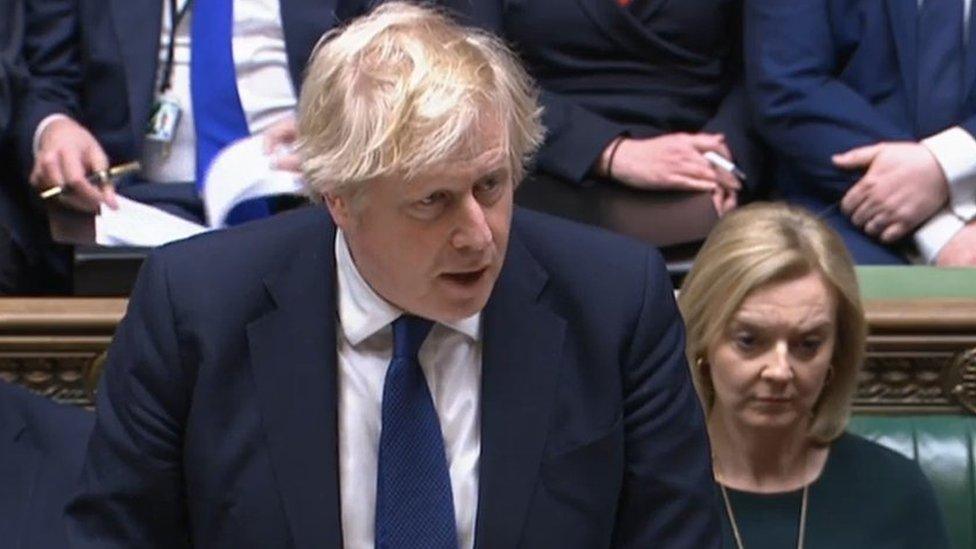Ukraine invasion: Economic war declared
- Published

The West's response to Russia's invasion of Ukraine is to squeeze it out of the global economy until Putin squeaks. Never in the field of economic conflict have so many weapons been deployed.
The main battlefront is over energy. Russia can punish its customers in the short term by cutting off gas supplies, but its European and British customers can punish Russia in the long term by finding alternative sources of energy.
Economic war brings business opportunities, which now extend to energy companies as much as suppliers of military equipment.
This is war. And you are on one of the front lines. It's not just for Ukrainians, who face bombs and bullets. It's for everyone who faces the consequences of an economic war, with inflation a lethal weapon.
"The West's" response to Russia's invasion of Ukraine is to do whatever it takes to isolate Russia and punish it.
"We will continue on a remorseless mission to squeeze Russia from the global economy," said Boris Johnson, announcing a barrage of bans on Russian finance, businesses, plutocrats, Aeroflot and denial of some western technology. The price of an iPhone in Moscow has reportedly soared.
This may hurt Russians but it won't surprise them much, as they got there first. They've been fighting a hybrid war for years, including disinformation and destabilisation of political institutions.
On the economy, Russia has dug in defences by reducing its dependence on the West for debt finance, and for technology. It has been trying to establish a parallel internet, with which to push the global one out, and it has resisted the spread of the big US-based tech companies.
The reluctance to supply Europe with gas over this winter, with which to build up stocks after a wind-starved/gas-hungry summer, was one way of destabilising economies with soaring prices feeding through to inflation. Building the Nord Stream 2 gas pipeline drove a wedge between Washington and Berlin - until this week.
Sustained hardship
Having shown it would use gas supplies to undermine and bully its close neighbours, at least Moscow gave Europe the opportunity of time to diversify gas supply, bringing it from Norway, North Africa and Liquified Natural Gas shipped from Qatar and the Gulf of Mexico.
But being 40% dependent on Russian gas, that is one weapon of war that could be used by either side. If Russia chokes off that supply to Europe, it sends prices spiralling and instantly inflicts deep economic pain on European households and business.

Building the Nord Stream 2 gas pipeline drove a wedge between Washington and Berlin
Britain doesn't buy much Russian gas - less than 3% of its needs - but it pays European prices, so it doesn't make much difference.
On the other hand, Boris Johnson has announced that it's time to remove that dependency on Russian oil and gas, and he appeared to be speaking for western allies when he did so.
He hasn't said how, or how fast. But if that is serious, we could be looking at an embargo on importing Russian energy.
That would inflict pain on Russia - it depends on hydrocarbons for around a third of its government revenue, and its economy fluctuates with the volatile fortunes of the industry.
For now, with prices high, the same countries that condemn the invasion of Ukraine are paying Russia a lot of foreign currency to keep warm, generate their electricity and fuel their factories. They/we are paying for Russia's war machine.
So there is a calculation: who moves first to cut energy supplies? Can Europe and the UK face the immediate consequences of sky-high gas prices, and will US consumers take the pain of even higher oil prices?
On the other hand, can Russia face the long-term consequences of losing its best customers, mindful that China and other Asian markets offers it alternative opportunities?
In a contest of which side is willing to sustain the deepest hardships, Russia's self-image - from its experience of the Second World War - is to assume it can outdo any adversary and play a long game.
Crude weapon
Compared with gas flowing down pipelines, oil supply is more easily sourced elsewhere and shipped. Russia is currently the third biggest supplier of crude and refined oil to Britain. That includes around 20% of Britain's diesel, coming from Russian refineries, and more routed through a Swedish refinery.
In the year to last September, British imports from Russia included £2.6bn worth of refined oil, £1bn of crude oil and £600,000 of natural gas - HMRC figures break that down for Scotland for 2019: £367m worth of imports, of which £280m was oil and gas. The return flow included £50m of power generating equipment and £21m of whisky, totalling £194m worth of Scottish exports. One element that has gone was the Russian coal for Longannet power station.
Britain could get its diesel elsewhere, but without Russia in the market, assume prices will go up sharply. There probably won't be shortages, but with demand outstripping supply, price is the way of rationing.
Some energy analysts are already guessing at peaks within this year of between $120 and $150 dollars per barrel of Brent crude. It has now passed through the $100 level, having risen more than 50% in the past year.
Energy security
The consequences come home to petrol and diesel, already at record prices, to heating for those off the gas grid and to numerous industrial uses for oil, including haulage and aviation.
They also come home to the debate about the future of the oil and gas industry. Three months ago, at Glasgow's COP26 summit, the pressure was building to stop drilling for new reserves and to block development of known fields, such as Cambo to the west of Shetland.
That campaign has caused a rift in the Scottish independence movement. The UK government wavered, and has since shifted to a much stronger line in favour of continued drilling.
"Energy security" will surely be the rationale to allow the industry to keep drilling, whatever the consequences for climate change. The UK government's priority from now will be to end the dependence on Russian oil and gas.
For the oil and gas sector in Scotland and beyond, there are opportunities from the new economic war, just as there will be also from the rearmament contracts that can be expected in the defence industry.
- Published25 February 2022

- Published24 February 2022

- Published24 February 2022

- Published7 March 2022

- Published24 February 2022
